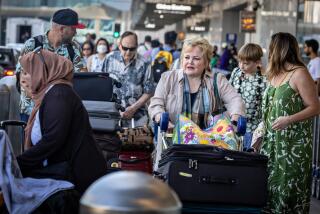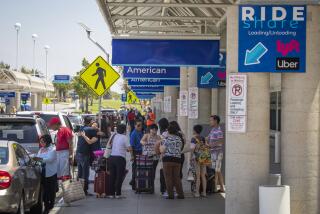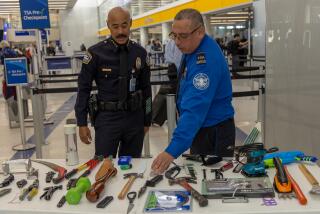Helping seniors through airport maze
GENE CROCKER, 82, is a strong-willed former Marine who nonetheless shrinks from the idea of doing battle with Dallas-Fort Worth International Airport at Thanksgiving. The only thing stronger than his aversion is his desire to see his grandchildren in Connecticut.
Just to be sure this grandfather doesn’t get stuck somewhere along the way, Andrew Crocker, his 28-year-old grandson, will meet him at the Dallas airport and accompany him on the final leg of the trip. The younger Crocker will fly from Amarillo, Texas, and his grandfather from Shreveport, La. That, the younger Crocker hopes, will calm his grandfather’s fears.
“I don’t know if this is because of [the airport’s] history or what he hears on the news, but he is afraid to connect through that airport,” said Crocker, a West Texas gerontology health specialist.
“He has asked repeatedly if we have enough time, will I be at his gate, etc., in addition to his comments about DFW being horrible.”
Being together for the holidays may be a warm and fuzzy concept, but it plays havoc with some seniors’ sense of security. With planning, preparation and the use of some new services, you can reduce the uncertainty and make the logistics of any trip easier on everyone.
If you call the airline in advance, for instance, you may arrange to have the passenger met curbside with a wheelchair if necessary and escorted through screening to the gate. Or you also may ask the airline for a pass allowing you to accompany your relative through screening to the gate.
However you decide to approach screening, it’s important that older travelers educate themselves because so much about air travel has changed in the post-9/11 world, said Nico Melendez of the Transportation Security Administration.
It’s important that all travelers understand the 3-1-1 rule for carry-on bags: Each passenger is allowed one quart-sized zip-locked bag containing liquids in containers of 3 ounces or less. An important exception, Melendez says, is that medications in their original containers are allowed in carry-on luggage, no matter what the size.
Remind older travelers that everyone must remove shoes for screening, so a pair of slip-ons might make life easier than lace-ups.
And passengers with artificial joints may set off screening alarms. Any traveler with a pacemaker shouldn’t step through the screening gate because the machine may offset the calibration.
These passengers should present a pacemaker identification card or note from their doctors at security and request a private screening, if necessary.
“This is about performing a security function while allowing passengers to maintain dignity,” Melendez said.
At least one older traveler finds that monetary thank-yous to non-government employees also can help ease the way. “I keep a lot of $1 bills in my pocket, and I grease the way with tips,” said 76-year-old Lucy Hack of Houston, who has continued traveling after suffering a heart attack.
If you would rather count on more than a pocketful of dollars, Doug Iannelli can help. He takes care of every detail of a senior’s trip, from making reservations to getting the traveler to his or her destination’s doorstep.
As owner of Atlanta-based Flying Companions (www.flyingcompanions.com), he’ll get his older clients checked in, take them through security, handle their carry-on luggage, sit next to them on the airplane and get them through ground transportation.
He notifies those waiting at the other end of any flight delays, cancellations or complications.
During this holiday season, he’ll accompany one senior from Atlanta to West Palm Beach, Fla., for $1,977. The package includes round-trip coach airfares for the client and Iannelli, ground transportation in Atlanta and his expenses.
“I saw the need for people to continue to be able to travel as they got older,” said Iannelli. “This has made a tremendous difference in the way people can remain independent.”
When booking travel, older passengers need to consider their seating priorities. Weak bladder? Book an aisle seat. Hearing aids? If they are wearing the type that amplifies noise and doesn’t filter background static, sit next to the window and keep one hearing aid off to reduce static.
In the end, Crocker said, seniors need to keep their eye on the goal.
“My granddaddy wants to see those grandchildren,” Crocker said. “The end result is the impetus.”
More to Read
Sign up for The Wild
We’ll help you find the best places to hike, bike and run, as well as the perfect silent spots for meditation and yoga.
You may occasionally receive promotional content from the Los Angeles Times.






